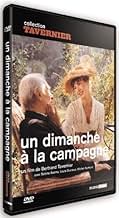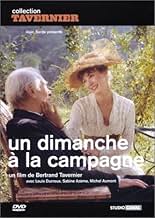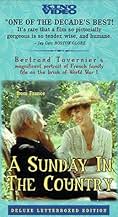CALIFICACIÓN DE IMDb
7.4/10
3.4 k
TU CALIFICACIÓN
Un anciano pintor cuyo hijo visita a su familia los fines de semana, también se ve sorprendido por la visita de su hija, aún soltera.Un anciano pintor cuyo hijo visita a su familia los fines de semana, también se ve sorprendido por la visita de su hija, aún soltera.Un anciano pintor cuyo hijo visita a su familia los fines de semana, también se ve sorprendido por la visita de su hija, aún soltera.
- Dirección
- Guionistas
- Elenco
- Nominada a1 premio BAFTA
- 13 premios ganados y 12 nominaciones en total
Sabine Azéma
- Irène
- (as Sabine Azema)
Geneviève Mnich
- Marie-Thérèse
- (as Genevieve Mnich)
- Dirección
- Guionistas
- Todo el elenco y el equipo
- Producción, taquilla y más en IMDbPro
Opiniones destacadas
I saw this film sixteen years ago, at a time when I did not see many 'filmhouse' movies yet. It made a strong impression on me, I wasn't used to so many 'open spaces' in films, which spectators have to fill according to their own ideas. Later I understood that once you start filling these 'holes' with pieces of yourself, the film becomes much more personal.
From time to time I think back to this film, like I did just now when I looked it up in the IMDB. Its storytelling, or rather story-hinting, is apparently so strong that even after sixteen years I am looking for some answers to the questions that the film raises.
In short: go see it.
From time to time I think back to this film, like I did just now when I looked it up in the IMDB. Its storytelling, or rather story-hinting, is apparently so strong that even after sixteen years I am looking for some answers to the questions that the film raises.
In short: go see it.
I saw this film as a gift. For images, reminding the work of an Auguste Renoir, for portrait of family and the small gestures defining the relations between its members, for lovely acting and for the good state of soul inspired by it.
I discovered it, in same measure, as a beautiful gift offered by Bertrand Tavernier. A precious gift about meaning of life and meanings of visits, about the games of children and problems of adults, about joy and the shadows of sadness, about a venerable manner and the lady helping him in ordinary problems.
Nostalgia ? Off course, but it represents more and , scene by scene, you feel it.
A beautiful film as a precious circle of emotions.
I discovered it, in same measure, as a beautiful gift offered by Bertrand Tavernier. A precious gift about meaning of life and meanings of visits, about the games of children and problems of adults, about joy and the shadows of sadness, about a venerable manner and the lady helping him in ordinary problems.
Nostalgia ? Off course, but it represents more and , scene by scene, you feel it.
A beautiful film as a precious circle of emotions.
A lot of people consider it Tavernier's best .
An old man lives in the country in a desirable property.He waits for his children's visit .Whereas his son ,Gonzague,who lives a bourgeois life with wife and kids frequently turns up,his daughter Irene , a socialite ,a woman ahead of her time is often too busy in Paris to remember his old papa.
On a clear sunny day,they all gather in the father's house .Suddenly the house does not look that much cozy.The novel on which the movie is based is called "Mr Ladmiral Va Bientôt Mourir" (M.Ladmiral is soon going to die)and Death shows beneath the placid surface : a terrifying vision of the old man on his death bed -there is a similar scene in John Huston's last work-;a fleeting souvenir of a picnic in the garden where they used to eat (wild?) strawberries;more prosaically,when the family arrives near the church,they can hear "Nearer to thee ,my God" (the Titanic band's canticle!).
The admirable sequence in the Guinguettes displays not only Tavernier's tribute to Auguste Renoir,but also his love for the true masters of the French cinema:Auguste's son Jean ("Une Partie de Campagne") ,Julien Duvivier ("La Belle Equipe") and Jacques Becker ("Casque d'or").
This is a brilliant movie by the man who is perhaps the greatest living French director.His command of the picture is so fascinating that even the frequent voice -overs are not redundant.
Like this?Try these.......
Make way for tomorrow Leo McCarey 1937
Une Partie de Campagne Jean Renoir 1936
Wild Strawberries Ingmar Bergman 1957
Eglantine Jean Claude Brialy 1971
The dead John Huston 1987
An old man lives in the country in a desirable property.He waits for his children's visit .Whereas his son ,Gonzague,who lives a bourgeois life with wife and kids frequently turns up,his daughter Irene , a socialite ,a woman ahead of her time is often too busy in Paris to remember his old papa.
On a clear sunny day,they all gather in the father's house .Suddenly the house does not look that much cozy.The novel on which the movie is based is called "Mr Ladmiral Va Bientôt Mourir" (M.Ladmiral is soon going to die)and Death shows beneath the placid surface : a terrifying vision of the old man on his death bed -there is a similar scene in John Huston's last work-;a fleeting souvenir of a picnic in the garden where they used to eat (wild?) strawberries;more prosaically,when the family arrives near the church,they can hear "Nearer to thee ,my God" (the Titanic band's canticle!).
The admirable sequence in the Guinguettes displays not only Tavernier's tribute to Auguste Renoir,but also his love for the true masters of the French cinema:Auguste's son Jean ("Une Partie de Campagne") ,Julien Duvivier ("La Belle Equipe") and Jacques Becker ("Casque d'or").
This is a brilliant movie by the man who is perhaps the greatest living French director.His command of the picture is so fascinating that even the frequent voice -overs are not redundant.
Like this?Try these.......
Make way for tomorrow Leo McCarey 1937
Une Partie de Campagne Jean Renoir 1936
Wild Strawberries Ingmar Bergman 1957
Eglantine Jean Claude Brialy 1971
The dead John Huston 1987
In pre-WWI France Monsieur Ladmiral prepares for the day in his large country house near Paris. It is Sunday, the day his son Gonzague and family frequently visit him. Gonzague arrives by train with his wife and three children - two young sons and a daughter. Monsieur Ladmiral walks to the station to meet them. Well actually he only makes it about half way there when he meets the family walking toward his house. Thus we are introduced to one of the themes - how Ladmiral deals with getting older (in this case by denying that he can't walk as fast as he used to).
On this particular Sunday Ladmiral is also treated to a rare visit by his daughter Irène. She arrives by car and her breezy, outgoing personality dominates. The children take to her, but the reactions of the rest of the family are much more complex. Gonzague has been the dutiful son who has done what was expected of him while Irène is clearly a bit of a free spirit. But equally as clear is that Ladmiral favors his daughter for her determination to live life on her own terms and is disappointed that his son has not been more aggressive.
It is amazing how much we come to understand the dynamics of this family from observing them during this one day. Typical of the hints we get is Gonzague's comment, in response to the excitement over Irène's car, that "I had children and not a car." By the end you feel that you can extrapolate backward in time to the essential history of this family.
Particularly poignant are the musing of the old man himself. He has been a painter of some repute and respect, but feels perhaps that he took too modest a path in his work, that he could have been more experimental and made more significant contributions. Is he wishing that he had been more like Irène than Gonzague, and that is why he fancies his daughter?
The pacing is slow and the filming is lush. You are left with a certain wistfulness. This may evoke memories to visits to your own grandparents.
The focus in on the personalities and the undercurrents of conflicted feelings that exist in all families.
On this particular Sunday Ladmiral is also treated to a rare visit by his daughter Irène. She arrives by car and her breezy, outgoing personality dominates. The children take to her, but the reactions of the rest of the family are much more complex. Gonzague has been the dutiful son who has done what was expected of him while Irène is clearly a bit of a free spirit. But equally as clear is that Ladmiral favors his daughter for her determination to live life on her own terms and is disappointed that his son has not been more aggressive.
It is amazing how much we come to understand the dynamics of this family from observing them during this one day. Typical of the hints we get is Gonzague's comment, in response to the excitement over Irène's car, that "I had children and not a car." By the end you feel that you can extrapolate backward in time to the essential history of this family.
Particularly poignant are the musing of the old man himself. He has been a painter of some repute and respect, but feels perhaps that he took too modest a path in his work, that he could have been more experimental and made more significant contributions. Is he wishing that he had been more like Irène than Gonzague, and that is why he fancies his daughter?
The pacing is slow and the filming is lush. You are left with a certain wistfulness. This may evoke memories to visits to your own grandparents.
The focus in on the personalities and the undercurrents of conflicted feelings that exist in all families.
Not much happens during "A Sunday in the Country", which depicts what the title suggests: a well-to-do French family having a Sunday gathering during what appears to be the 1920s - it is the world of Marcel Proust, only a few decades later. This presents more of a family portrait and character revelation piece than a plotted story. We get to know the main characters and their relationships - the genteel old father dotes on his exciting daughter and is critical of his dour, proper son. He is dependent on the crabby housekeeper who rules the home. It is a mellow, fine-looking film, sprinkled with comments on impending death and art. Sabine Azema steals the show as the charming but flaky Irene.
¿Sabías que…?
- TriviaThe film is included on Roger Ebert's "Great Movies" list.
- ErroresIrene's flower in her bodice disappears and then reappears.
- Bandas sonorasQuintette pour piano et cordes Op. 115
Written by Gabriel Fauré
Performed by Le quatuor Via Nova, Jean Hubeau piano solo
Selecciones populares
Inicia sesión para calificar y agrega a la lista de videos para obtener recomendaciones personalizadas
- How long is A Sunday in the Country?Con tecnología de Alexa
Detalles
- Fecha de lanzamiento
- País de origen
- Idioma
- También se conoce como
- A Sunday in the Country
- Locaciones de filmación
- Château du Grand Saint-Léger, Villers-en Arthies, Val-d'Oise, Francia(house and garden)
- Productoras
- Ver más créditos de la compañía en IMDbPro
Taquilla
- Total en EE. UU. y Canadá
- USD 2,411,143
- Total a nivel mundial
- USD 2,411,143
Contribuir a esta página
Sugiere una edición o agrega el contenido que falta


























